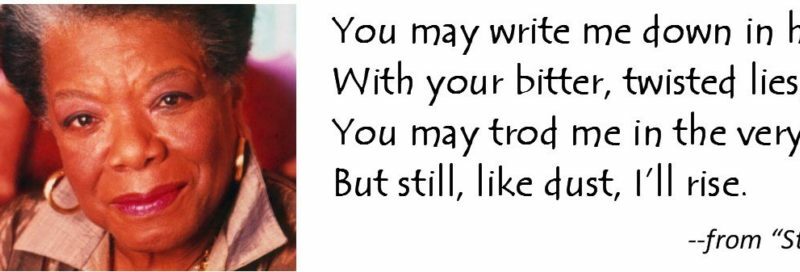



In the most recent Coen brothers film, Inside Llewyn Davis, the protagonist — a struggling Greenwich Village folksinger in 1961 — is based, very loosely, on Dave Van Ronk, a little-known (outside folk music circles) but influential folk-singer who helped define the folk music revival of the late fifties, and mentored the young Bob Dylan and others during the early 1960s when what Van Ronk called the “great folk scare” took off. To understand the atmosphere of that music scene, the Coens relied on Van Ronk’s memoir (coauthored with Elijah Wald), The Mayor of McDougall Street. Van Ronk recounts his serious involvement with various left-wing factions of the period.
Little of Inside Llewyn Davis refers to the political atmosphere that permeated the Greenwich Village folk scene of the early 1960s. The film is filled with despair and loneliness, but the folk music world of that period was filled with hope and engagement.
» Read more about: Protest Music Is Always Blowin’ in the Wind »
This week a DVD of The Abbott and Costello Show‘s 1953-54 season was released amid nostalgic fanfare. The old comedy team is mostly remembered today because of its immortal “Who’s on First” baseball routine – an almost Beckettian example of miscommunication that’s been enshrined in Cooperstown’s Hall of Fame. However, the two Jersey boys also enjoy an afterlife in conservative circles through a very similar sketch, “The Loafers Union,” in which straight man Bud Abbott proudly announces to sidekick Lou Costello that he has landed a “loafing” job at a bakery. From this spare description, fans of “Who’s on First” can pretty much guess the kind of linguistic linguine the two former Vaudevillians will make of this double entendre:
Abbott: I got a job at a bakery.
Costello: Good! What’re you doing there?
Abbott: Loafing.
Costello: Loafing?
Abbott: Loafing!
» Read more about: Abbott & Costello’s Vintage Union Bashing »


People who hate government get a lot of aid and comfort from America’s news media, which tend to give big business a party pass when it comes to incompetence and corruption. While any government agency – from Congress to your local school board – is fair game for attacks, business institutions usually come under an investigative spotlight only if the news story has already generated a lot of public heat.
For example, when the government released its report on Shell’s behavior in the Arctic, newspapers put it among the top news stories. Similarly, when the City of Los Angeles brought suits against a couple of the nation’s biggest banks for systematic lending abuses, this made the front section, although not the front page. Likewise, when an oil company paid $5.15 billion to clean up environmental contamination, it was big news.
For the not-so-big stories about corporate screw-ups,


What you are about to read is about the FCC and “net neutrality.” But not really.
As you probably know, the Federal Communications Commission is in the process of revising its rules and regulations for the Internet. It’s tried twice before and both times the telecommunications industry has (successfully) gone to court to get the rules tossed out.
One of the hottest topics is net neutrality – the idea that your Internet service provider has to treat equally whatever content is flowing through its tubes. This is important, because without net neutrality your ISP could strike separate deals with different content providers, allowing, say, Hulu to flow freely, but letting Netflix drip through at a slower pace. Or loading the Drudge Report quickly, but throttling Left Business Observer.
A secondary effect of ending net neutrality concerns what you pay to Time Warner (or AT&T or Verizon or Comcast) —
» Read more about: Net Loss: Why One FCC Commissioner Hates His Job »
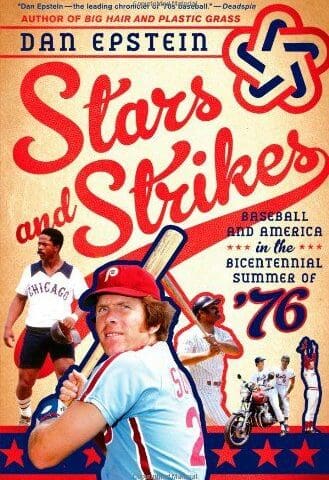
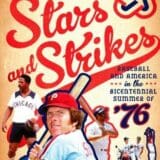
The 1970s are often regarded as a time of false promise (the great broom of Watergate merely clearing the way for Ronald Reagan) or hideous excess (leisure suits, disco, Chrysler LeBarons). Sports writer Dan Epstein sees the Bicentennial decade differently, however. To the author of Big Hair and Plastic Grass, they were nothing less than the end of professional baseball’s innocence. Epstein puts his finger on one year in particular as the turning point for both America’s Pastime and America itself. His new book, Stars and Strikes: Baseball and America in the Bicentennial Summer of ’76, conjures a time and a place where greed, injustice and American piety collided.
Against the backdrop of a newly resurgent New York Yankees team and the juggernaut known as the Big Red Machine, Epstein examines how an increasingly militant baseball players union fought for free agency – a fight that would lead to far-reaching consequences for the game.


After more than a month of unsuccessful attempts to reach Lionsgate Entertainment CEO Jon Feltheimer through letters and phone calls, it was time to pay him a visit. Rank-and-file musicians wanted to discuss Lionsgate’s practice of offshoring its musical scoring to distant countries – something that limits local musicians’ ability to earn a living and deprives our communities of tax revenue.
On Tuesday union members and supporters of the American Federation of Musicians’ Listen Up! campaign — including professional musicians, labor allies, faith and community leaders — gathered in Santa Monica’s Stewart Street Park for a rally. The spirited event included AFM Local 47’s executive board and a supportive crowd of musicians representing members from across our union. We were joined in song by our fellow AFM members and Grammy nominees Lisa Haley and the Zydakats. We heard moving speeches from Santa Monica City Councilmember Kevin McKeown and other friends,
» Read more about: Musicians Bring Campaign to Stop Offshore Scoring to Lionsgate »


Complexities
A bag of oranges
doesn’t appear
to be heavy
but hold one
yourself and count
three hundred
cars driving by.
As she stands between
the stack of salty
peanuts and dusty
grapes, the bag
gets heavier and it
retains that heaviness
when it’s passed through
the window; and the driver,
hoisting it onto
the passenger’s seat,
thinks, this is a lot of
fruit for two dollars.
Source: “Complexities” first appeared in CQ: California State Poetry Quarterly, Winter 1986-1987; Volume 13, Number 4. It was subsequently selected as one of the poems for the 1988 SMARTS (Santa Monica Arts) Poetry on the Bus project. It also appeared as a spoken word track on Vehemence (New Alliance Records, 1993).
Bill Mohr is an associate professor in the Department of English at California State University,
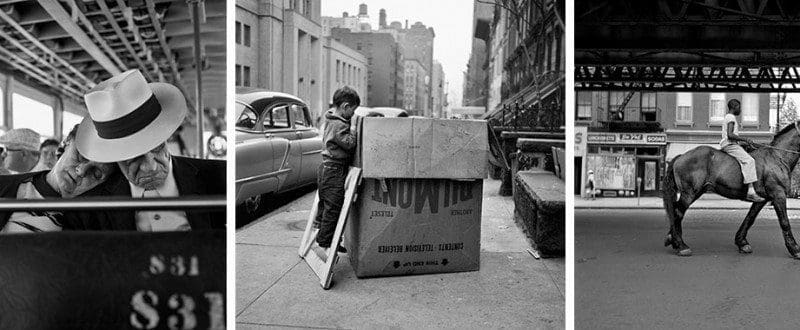
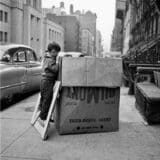
Photographer Vivian Maier spent her last months on a park bench overlooking Lake Michigan, her secret life boxed up in storage units around Chicago. Her tens of thousands of negatives, 16mm films and voice recordings (not to mention newspaper clippings, receipts, unopened IRS refunds, blouses and hats) could easily have disappeared into obscurity if it weren’t for a young real estate agent and amateur local historian, John Maloof, who has a penchant for auctions and flea markets.
If you enjoy photography and the unpredictability of human existence you’ll enjoy Maloof’s film, Finding Vivian Maier. The documentary describes an eclectic journey to unearth the life and motivations of an eccentric subject, an artist who never sought to have her pictures displayed or published.
Maier seemed to have trouble making close human connections, but with her camera she was uncanny in creating intimacy with the widely diverse life on the streets of Chicago and New York.
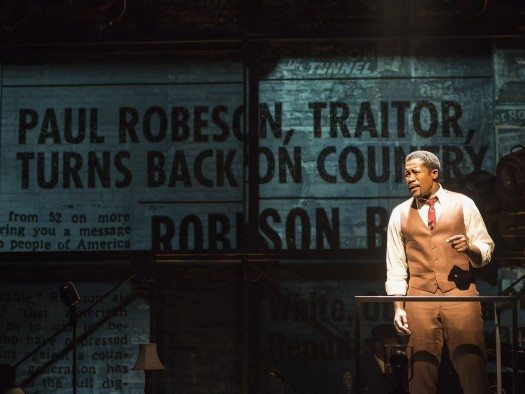
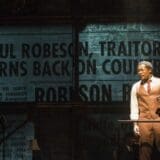
You’ve heard him sing Ol’ Man River, but you may not know his name or that he was a left-wing activist. As mentioned in the program notes for the one-man show The Tallest Tree in the Forest, now playing at the Mark Taper Theater, “the most extraordinary thing about Paul Robeson’s life is that more people don’t know about it.”
For that we can thank the House Un-American Activities Committee that questioned Robeson’s loyalty and effectively destroyed his career, along with the careers of hundreds of other American radicals of the 1940s and 50s. And what a career it was. The son of a father born into slavery, Robeson excelled in collegiate sports and academics and, after earning a law degree from Columbia University, joined the Harlem Renaissance and became a brilliant stage and music performer. Robeson developed a worldwide following with his powerful renditions of Negro spirituals and later with his performance of Othello in New York,
» Read more about: The Tallest Tree in the Forest: Appreciating Paul Robeson »


Nina Revoyr is the author of four acclaimed novels, including Southland, The Age of Dreaming and Wingshooters. She is also executive vice president of Children’s Institute in Los Angeles and has taught at Pitzer and Occidental colleges, and at Antioch and Cornell universities. Revoyr will be this year’s keynote speaker at the Los Angeles Alliance for a New Economy’s Women for a New Los Angeles Luncheon on May 9. We recently spoke to her about her work and Los Angeles’ place in it.
Your first novel, A Necessary Hunger, dealt with two young girls on the cusp of adulthood. What are the particular challenges young people of color face growing up in Los Angeles today?
I can’t speak to all young people of color,
» Read more about: Trauma and Vision: An Interview With Novelist Nina Revoyr »


Vocation of the Chair
It longs to be the one
who holds you, keeps you
from falling, its curved legs
shapely as a bride.
The chair that would be saint.
martyr, acolyte. Your little
sins of omission and false pride
cannot sway it — the chair believes
in you. It grows taller in the dark.
Soon it will fill the room,
its cushion of praise all you need
in the crude and faithless light.
Laurel Ann Bogen is the author of 10 books of poetry and short fiction. In 2016, Red Hen Press will publish All of the Above: New and Selected Poems 1975-2015. From 1996 until 2002 she was literary curator at the Los Angeles County Museum of Art.


You’d think that that public television would support public education, but you’d be wrong. The Public Broadcasting System (PBS) has gotten in bed with the billionaires and conservatives who want to privatize our public schools. PBS has nary a word to say about the big money — from folks like the Walton family (Walmart), Microsoft founder Bill Gates, Eli Broad, business titan and former New York mayor Michael Bloomberg, media mogul Rupert Murdoch, Joel Klein (former NYC schools chancellor and now a Murdoch employee), and their ilk — that has been funding the attack on public schools and teachers unions. They’ve donated big bucks to advocacy groups, think tanks, and candidates for school boards who echo their party line.
PBS and its local stations have fallen all over themselves to promote Waiting for Superman, a documentary film that could easily been mistaken for a commercial on behalf of charter schools.
Gone but certainly never forgotten, Pete Seeger’s life and music will stand front and center this Saturday afternoon as the Ash Grove Foundation honors him with a hoedown on Wilshire. The lineup features a mix of 10-minute musical tributes, personal recollections and spoken word. Guests will include local blues demigod Bernie Pearl, singer Claudia Lennear (seen in the documentary Twenty Feet From Stardom) and civil rights movement protest singer Len Chandler. (Grammy-winning singer Ben Harper, ex-Blaster Dave Alvin, Chicano rockers Quetzal and others are unconfirmed invited artists.)
If the music isn’t enough to draw you in, City of Quartz author Mike Davis will also participate in the proceedings, as well as poet-filmmaker S. Pearl Sharp and people’s lawyer Art Goldberg – there’s even talk of his sister Jackie appearing, too. See you there at the First Unitarian Church’s Fritchman Hall, 2936 W. Eighth St.;
» Read more about: Pete Seeger: A Tribute to His Music and Legacy »

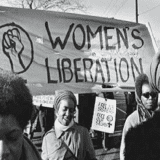
The civil rights movement of the 1960s is now iconic. Who would speak out against its aims? And the farm workers are finally getting their due as Cesar Chavez and the power of the organization he led are being recalled in film and literature. But who speaks up for the women’s liberation movement? In popular culture, its activists were usually portrayed as self-centered, bra-burning,* man-hating New Yorkers.
To create an historic record of what really happened in the women’s movement, and to rescue it from ridicule and misconceptions, Boston University recently organized a conference titled, “A Revolutionary Moment: Women’s Liberation in the Late 1960s and Early 1970s.” The gathering drew more than 600 people — about two-thirds women activists and academics of that certain age, and one-third younger women and men interested in getting the history right.
In the opening conference session feminist historian Sara Evans explained that the spark that lit women’s liberation came from the other movements of the 1960s,


There haven’t been, to put it mildly, many films about America’s labor movement. Take away Salt of the Earth (1954) and Norma Rae (1979) and what are you left with? Cesar Chavez, then, offers to fill a cavernous void in the public’s knowledge about both union organizing and the history of the country’s mostly Latino agricultural workforce. Directed by the Mexican actor and film producer Diego Luna (Y Tu Mamá También, Elysium), the film follows Chavez (Michael Peña) from the time he parted company with the grassroots Community Service Organization (CSO) to the signing of union contracts with growers following a successful consumer boycott of table grapes.
Working with a screenplay by Keir Pearson, Luna wisely passes on a sweeping Gandhi-style treatment of Chavez’s entire life. This allows Luna and cinematographer Enrique Chediak to linger on the arid poetry of life in California’s Central Valley (played here by Sonora,


When Diego Luna was growing up in Mexico he’d sometimes hear references to Cesar Chavez and the union of farm workers he had organized in America. Luna, who would become one of his country’s leading film stars, remembers being struck as a 13-year-old by television images of Chavez’s funeral – the man was so modest, his coffin was an unpainted wooden box. A few years ago Luna began assembling a production company to film one critical chapter in Chavez’s life – the 10-year period in which he formed the United Farm Workers Organizing Committee and which culminated with the triumph of the consumer grape boycott. Cesar Chavez opens this week and Luna, while in Los Angeles to promote the film, spoke to Capital & Main about the movie, the man and the movement he created.
Capital & Main: Your film is a biography but is there something more behind it?
I think its message is of what we can do when we unite.
» Read more about: Interview With ‘Cesar Chavez’ Director Diego Luna »
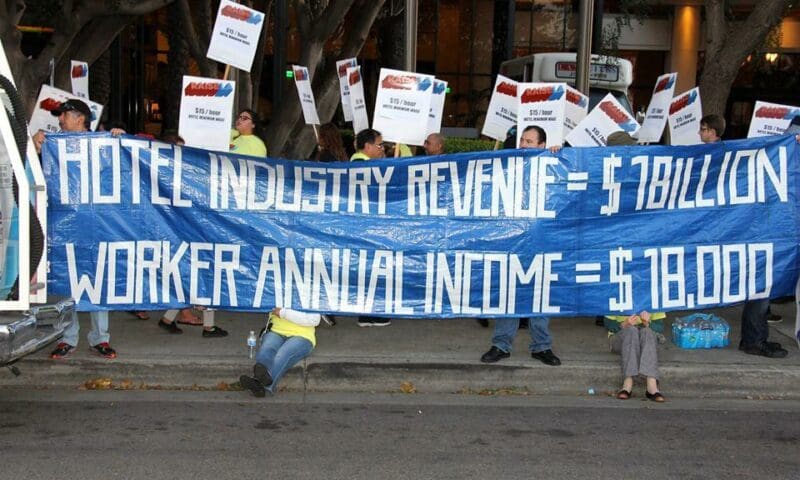
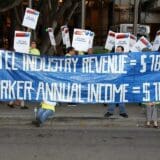
Last week the L.A. Times ran an editorial about the city’s proposed hotel worker minimum wage policy. Given past history—the Times has opposed every local living wage proposal over the past 17 years—it’s natural to see progress in a piece that acknowledges that “persistent poverty” is a “fundamental challenge” and argues that “Creating policies that help lift people out of poverty should be one of government’s top priorities.”
Many have read the Times’ editorial as a call for a broader policy covering more workers, which is a kind of backward endorsement of the Raise LA proposal. In the end, however, the Times stays true to its track record, opposing a $15 minimum wage not only for hotel workers but effectively for others as well.
The point is evident at the bottom of its piece, where the editorial board suggests (without evidence) that raising wages to this level may harm business,
» Read more about: L.A. Times’ Double Talk on Raising Wages »


Thirteen years ago Barbara Ehrenreich’s Nickel and Dimed touched off a debate that still rages about the difficulty of low-wage earners – particularly women – to earn a living that merely provides for the basics of existence, let alone its creature comforts. This week the documentary film Paycheck to Paycheck: The Life and Times of Katrina Gilbert continues that debate as it tracks single mother Katrina Gilbert over the course of a year as she tries to pay rent and put food on the table while navigating Tennessee’s social service and health care bureaucracies. If anything, Gilbert’s harrowing story shows how little things have changed for the working- and near-poor since Nickel and Dimed.
One of 42 million American women living on the edge of poverty, Gilbert is a nurse’s aide earning $9.49 an hour in Chattanooga without health care benefits. She suffers from a hyperthyroid condition and is seen deciding which of her many prescriptions she can afford to buy – while also struggling to finish a college education that could lift her living standard beyond the trailer she shares with her three young children.


Beatriz Rios-Nava, 57, has been driving trucks for 10 years. Since starting with a company at the port in Long Beach, she has passed the long hours of waiting in shipping yard queues by taking phone-camera snapshots of her environment: her morning coffee and bread nestled on the dashboard of her truck, her co-workers picketing for unionization outside of their company. Her growing collection of images documenting her life on the piers of Long Beach will be showcased in Solitude to Solidarity, a weeklong group exhibit that runs for the next week. (See information at the end of interview.) I spoke with her at her home in Compton, which she moved into three years ago, hoping to settle somewhere closer to her work. We sat on a black leather sofa in her living room, beneath a hanging dreamcatcher, as she attempted to calm her dog Picasso, who was excitedly bouncing between us.
» Read more about: Beatriz Rios-Nava’s Truck-Driving Odyssey »